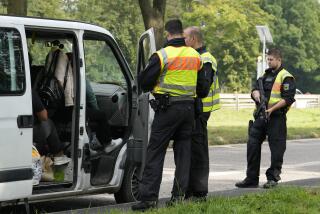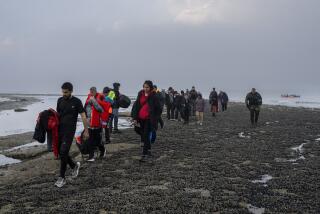Violence and barriers won’t stem tide of migrants to Europe, U.N. warns
- Share via
Anti-immigrant riots, border barriers and hate crimes won’t deter the thousands of refugees from Syria and other war-torn regions, a U.N. special envoy on migrant rights warned Tuesday after days of violence against those seeking to reach safety in Europe.
United Nations officials also put European Union states on notice that there is no end in sight to the influx of migrants arriving to the continent after perilous sea voyages to escape turmoil in the Middle East and Africa.
“Building fences, using tear gas and other forms of violence against migrants and asylum seekers … will not stop migrants from coming or trying to come to Europe,” said Francois Crepeau, the world body’s special envoy for migrant rights. “Let’s not pretend that what the EU and its member states are doing is working. Migration is here to stay.”
Thousands of men, women and children have been arriving daily to the southern reaches of Europe, many entering through Greece and making their way northward through Macedonia and Serbia to Hungary and other nations in the more affluent north of the 28-nation EU.
The throngs amassing at border crossings have begun to overwhelm authorities in the Balkans, provoking chaotic scenes in recent days of refugees surging through the barriers and being driven back by truncheon-wielding police and tear gas. And the gathering pace of desperate asylum-seekers in need of food, water and shelter has stirred angry protests and arson attacks on sites being opened to house them.
A record single-day total of 2,093 migrants arrived on Monday in Hungary, where 140,000 have entered the former communist country in spite of the government’s efforts to build a 13-foot-high barrier of razor wire to keep them out.
“It is in the interest of all of us, Hungarians and Europeans, to develop some kind of order or regularity” to the massive migration that has inundated Europe this summer, government spokesman Zoltan Kovacs told the Associated Press on Tuesday, calling the influx “unsustainable” in his economically struggling country.
Kovacs defended the much-maligned use of razor wire, saying that “international experience” shows such barriers can cut the volume of arrivals by at least 80%.
Hungarian Prime Minister Viktor Orban said the migrant influx threatened to overwhelm the country to the detriment of all.
“If we do not take meaningful steps, we will become a lifeboat that sinks beneath the weight of those clinging onto it,” he told the daily Magyar Hirlap, alluding to the more than 2,000 migrants who have lost their lives on overcrowded vessels so far this year.
Greece, the EU’s poorest country, has seen more than 160,000 migrants enter the country this year, most making their way through Turkey and across the eastern Mediterranean to a few islands. Greek migration officials have been moving the refugees to processing centers in Athens, from which most travel onward through the Balkans with the aim of gaining entry to Germany, Austria, Sweden and other more prosperous states.
The wave of Syrians, Eritreans, Afghans and others fleeing violence in their home countries has reached Macedonia, Serbia and Hungary, igniting resistance among populations fearing the impoverished arrivals will compete for scarce jobs.
“We are anticipating that this influx and this route is going to continue at the rate of up to 3,000 people per day,” Melissa Fleming, spokeswoman for the U.N. Office of the High Commissioner for Refugees, told journalists in Geneva.
A fire early Tuesday at a gymnasium that was being outfitted to house refugees in Nauen, Germany, about 10 miles west of Berlin, destroyed the facility, authorities in Brandenburg state reported. The blaze at the shelter, which was not yet inhabited, was believed to have been deliberately set and followed a violent weekend of attacks on a migrant facility in Heidenau, near Dresden.
German Chancellor Angela Merkel on Tuesday visited the Heidenau camp, where the recent arrival of 250 asylum-seekers sparked anti-immigrant protests by more than 1,000 people.
“It is vile for far-right extremists and neo-Nazis to try to spread their hollow, hateful propaganda, but it is just as shameful for citizens, including families with children, to join them” in the protests, Merkel said. The crowds that massed around the camp Saturday threw rocks, bottles and smoke bombs at police in a melee that left at least 31 injured.
The migration of desperate refugees is expected to reach 800,000 to Germany this year, or four times the number who sought asylum in the country in 2014.
The weekend violence was not representative of the prevailing attitude in Germany, the populist tabloid Bild reported in a front-page story headlined “Help refugees!” and two pages of advice to the government and citizens on what should be done to accommodate them.
Follow @cjwilliamslat for the latest international news 24/7
More to Read
Sign up for Essential California
The most important California stories and recommendations in your inbox every morning.
You may occasionally receive promotional content from the Los Angeles Times.











